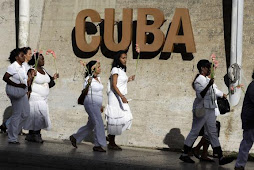Repression in Cuba during Times of Peace and Transition
April 7, 2014
Jimmy Roque Martinez
HAVANA TIMES – I first saw footage of an official act of reprisal (mitín
de repudio) in Cuba in the Cuban film Memories of development. The
footage showed a group of people beating up a person. The images were
from the eighties, during the Mariel exodus.
Seeing those images was painful. I felt a mixture of pain, shame, anger
and even loneliness. I find it curious that I've never met anyone who
has admitted (with shame or pride) having participated in such actions.
I don't believe all who did have left the country.
I recently got my hands on acts of reprisal carried out very recently –
the documentary Gusano ("Scum"), by the Estado de SATS group. The film
documents some violent acts against the opposition that are evidently
organized by the Cuban government.
In Cuba, people don't even organize themselves independently to march in
front of the US Interests Section and demand the lifting of the
blockade, something which, in theory, should not be a source of conflict
between the Cuban government and such demonstrators – but any kind of
autonomy is inadmissible here on the island.
It is inconceivable that a government should pit its own citizens
against one another. Cuban military officers send civilians to verbally
and physically attack other (peaceful) civilians, many a time without
even telling them why or telling them anything about the people they are
supposed to attack.
Many of these aggressors are opportunists who are looking after their
privileged positions or illegal businesses, and participating in these
reprisals is a kind of endorsement that guarantees personal protection.
There are also cases in which people feel some antipathy towards the
person targeted for a reprisal and are given an opportunity, by the
government, to attack their personal enemy.
The people's resources are used to attack the people, to pit neighbor
against neighbor.
There are two aspects of these actions that I consider particularly
dangerous. One is the participation of military officers dressed as
civilians, who drive vehicles with regular license plates. This ought to
be illegal, as military officers trained in personal defense and paid to
attack others conceal their true identity, playing the part of ordinary
people.
The other point is the subordination of the Ministry of Education to the
Ministry of the Interior, caught sight of in the fact students who are
not of age are involved in violent acts, probably without the consent of
their parents.
They are made to skip classes, taught that violence is a means of
defending one's criteria, and exposed to the risk of getting hurt when
the violence is unleashed.
The Ministry of Education should have to respond publicly and before the
law for this. Is part of its aim as a social institution to teach
violence, to teach the young that imposing one's viewpoints, not
debating, is a valid form of communication? Is public education
subordinate to a military institution in Cuba?
Source: Repression in Cuba during Times of Peace and Transition - Havana
Times.org - http://www.havanatimes.org/?p=102854
Subscribe to:
Post Comments (Atom)





No comments:
Post a Comment